This site is supported by our readers. We may earn a commission, at no cost to you, if you purchase through links.
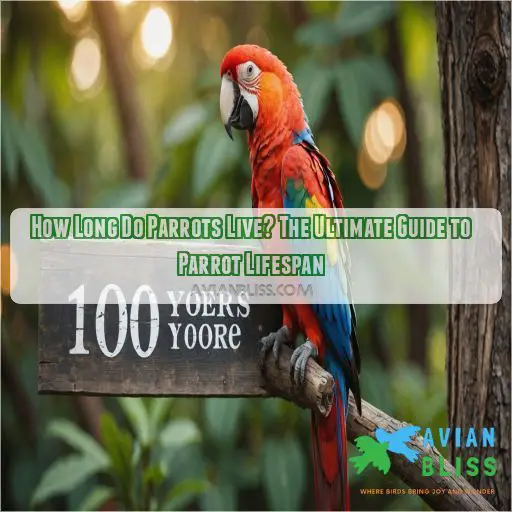
The little guys, like budgies and cockatiels, typically live between 8 and 15 years.
But the bigger birds, such as macaws and African Greys, can easily hit their 50th birthday with the right care.
If you’re thinking of getting a parrot, be prepared to commit for the long haul! They’re not called "lifers" for nothing.
Table Of Contents
Key Takeaways
- Parrots have varying lifespans, with smaller species like budgies living 8-15 years, and larger birds like macaws and African Greys reaching 50+ years with good care.
- A parrot’s environment, nutrition, and mental stimulation are key to a long life. Aim for a spacious, safe, and engaging space, a balanced diet, and plenty of social interaction.
- Common health issues like candidiasis, avian polyomavirus, and proventricular dilatation disease can impact their lifespan, so regular vet check-ups are vital.
- Owning a parrot is a serious, long-term commitment. These intelligent, social birds require time, resources, and dedication, and they may even outlive their owners!
Parrot Lifespan: a Comprehensive Guide
Whether you’re a bird enthusiast or just curious about these colorful creatures, you’re probably wondering how long parrots live. With over 350 parrot species, their lifespans can vary greatly, and there’s a lot to uncover.
Average Lifespan of Popular Parrot Species
The lifespan of a parrot varies depending on the species. Smaller parrots, like budgies and cockatiels, typically live 8 to 15 years. Larger parrots, such as macaws and African Greys, can live 25 to 50+ years with excellent care. The oldest recorded parrot was a cockatoo that lived to be at least 82 years old. That’s a whole lot of birthdays!
Factors Influencing Longevity
There are several factors that influence a parrot’s longevity. Genetics play a role, but it’s not just about nature – nurture matters, too. For instance, parrots in captivity often outlive their wild counterparts due to reduced risks and access to veterinary care.
Environmental factors like stress, sleep, and climate also come into play. A parrot’s environment should be spacious, safe, and stimulating to encourage exercise and mental engagement. This includes providing ample opportunities for flight and exploration.
Additionally, a well-balanced diet is super important. While seeds might be their favourite, they’re not the healthiest option. Aim for formulated pellets or extruded diets, supplemented with fresh fruits and veggies.
Importance of Nutrition, Exercise, and Mental Stimulation
Nutrition, exercise, and mental enrichment are key to a long and healthy parrot lifespan.
A balanced diet, including formulated pellets, fresh fruits, and vegetables, is essential for parrot nutrition.
Provide ample space for exercise and habitat exploration.
Keep your parrot mentally stimulated with enrichment toys to prevent behavioral issues.
A healthy parrot is bright and alert, with clean, smooth, shiny feathers and no eye or nose discharge.
Factors Affecting Parrot Lifespan
So, what exactly determines how long these feathered friends stick around? Well, it turns out that a bunch of factors play a part in a parrot’s lifespan, and we’re about to look at the four big ones. Get ready to learn how you can give your parrot pal the best chance at a long and happy life.
Diet and Nutrition
As a parrot parent, you know that keeping your feathered friend healthy and happy is a top priority. So, let’s talk about diet and nutrition, ’cause a well-fed parrot is a step towards a longer lifespan.
First off, forget about an all-seed diet. Think of it as junk food for parrots. Instead, offer a balanced formulated pellet or extruded diet, making up about 80% of their daily grub. These formulated foods are like parrot superfoods, ensuring they get all their essential nutrients.
Now, no diet is complete without fresh fruits and veggies. Think of it as a rainbow on a plate—the brighter, the better. Fruits and veggies are nature’s vitamins, but don’t go overboard. A little of everything is key to a balanced diet.
And remember, treats are fine in moderation. Just steer clear of salty and high-fat foods, which can lead to health issues.
Environment and Habitat
Your parrot’s living space has a big impact on how long they live. Here are some key things to keep in mind:
- Cage size and space: Make sure your parrot’s cage lets them stretch their wings out fully and move around freely. A roomy cage helps them exercise and keeps them from getting bored.
- Toy selection and perch types: Give them different perches and toys to create a fun environment. Different textures and materials encourage them to explore and keep their minds active.
- Outdoor access and indoor safety: Parrots love spending time outside, getting fresh air and sunshine. But always keep a close eye on them to make sure they don’t escape or get hurt by predators. Inside, create a safe space, free from things like open windows, other pets, or poisonous stuff.
Veterinary Care and Health Check-Ups
Regular check-ups with a veterinarian are a must for your feathered friend. These visits can help spot any health issues early on and help your parrot live a long and healthy life.
Vets can provide guidance on common parrot health issues, like feather plucking or loss of appetite. They’ll also help you figure out preventive measures, such as a healthy diet and environment, to keep your parrot in tip-top shape.
Don’t forget to ask about blood work and other tests to catch any potential problems early.
Socialization and Interaction
Parrots are highly social creatures that thrive on companionship and interaction. Here’s how socialization and interaction impact their lifespan:
- Parrot Playgroups: Interacting with other parrots can provide mental stimulation and help prevent loneliness.
- Bonding: Spending quality time with your parrot is key to building a strong bond, enhancing their well-being and potentially extending their lifespan.
- Social Interaction: Parrots crave daily attention and interaction. As flock animals, they benefit from regular social time, which meets their natural social needs.
- Parrot Communication: Training and positive reinforcement encourage communication, strengthening your bond and their happiness.
- Flock Behavior: Recreating a sense of flock through multiple parrot companions or regular interaction helps meet social needs.
Improving Your Parrot’s Lifespan
So, you’ve got a parrot and want it to live as long as possible? You’re in the right place. Let’s get into some practical tips to improve your parrot’s lifespan and keep your feathered friend happy and healthy for years to come.
Providing a Balanced Diet
Feeding your parrot a healthy and balanced diet is one of the most important factors in improving their lifespan. Here’s what you need to know about parrot nutrition:
- Seed vs. Pellets: Avoid seed-based diets, as they can be high in fat and lacking in essential nutrients. Instead, offer a formulated pellet or extruded diet, which provides a complete and balanced nutrition (about 80% of their diet).
- Nutritional Needs: Parrots also need fresh fruits and vegetables, but these should be given in moderation and always make sure they’re safe for parrots.
- Supplementing Diets: Consult with your veterinarian to make sure your parrot is getting all the necessary nutrients and to determine if any supplements are needed.
- Homemade Recipes: You can also find homemade parrot food recipes online, but always consult with an expert before trying something new.
Creating a Stimulating Environment
Creating a stimulating environment is key to improving your parrot’s lifespan and overall well-being. Here are some practical tips to achieve this:
- Provide a variety of parrot toys and foraging enrichment options to encourage play and exploration. This could include puzzle feeders, which provide mental challenges, or shreddable toys that satisfy their natural chewing instincts.
- Design a spacious cage with climbing opportunities and multiple perches at different heights to promote movement and exercise. Include a range of textures and materials, such as natural wood perches and rope swings.
- Offer opportunities for parrot play and training outside the cage. Set up a safe, supervised play area with stands, perches, and play gyms to encourage flight and exploration. You can also teach tricks and new words to keep their minds active.
Scheduling Regular Veterinary Check-Ups
Scheduling regular vet visits is a key part of being a responsible parrot parent. These check-ups are like taking your car in for a service – a little preventative care goes a long way. By staying on top of your parrot’s health, you can catch any potential issues early on and keep your feathered friend in tip-top shape.
Finding a good parrot vet is worth its weight in gold. They’ll guide you on everything from diet and exercise to common health issues. Most vets recommend annual wellness exams, which include blood work and a physical exam. This might seem excessive, but for parrots, who often hide illness, it’s really important.
Ensuring a Safe and Healthy Living Space
Making sure your parrot has a safe and healthy home is super important for their happiness and long life. Here are three things to think about:
- Cage size and perch types: Get a big enough cage so your parrot can stretch its wings. Make sure the cage has perches at different heights and sizes to help them exercise and feel comfortable.
- Safe toys and hazards: Give your parrot a bunch of safe, non-toxic toys to keep them busy and entertained. Check their space regularly for things that could be dangerous, like poisonous plants, open windows, or other pets.
- Noise levels and ventilation: Parrots are sensitive to noise and air quality. Put their cage in a quiet place with good air flow, away from loud noises and cigarette smoke.
Common Parrot Illnesses and Health Issues
Knowing about common illnesses and health issues is super important when you’re taking care of a parrot. You’ll want to be aware of the signs and symptoms of illnesses like candidiasis, avian polyomavirus, proventricular dilatation disease (PDD), and chlamydiosis, so you can spot them early and give your parrot pal the best chance at a long and healthy life.
Candidiasis
This common illness in parrots is a fungal infection that affects the digestive system. It’s important to be aware of this health issue, as it can impact your parrot’s quality of life. Here’s a quick overview of candidiasis, including symptoms, treatment, and prevention:
| Category | Details |
|---|---|
| Symptoms | Keep an eye out for any changes in your parrot’s behaviour, such as loss of appetite, lethargy, or changes in droppings. |
| Treatment | Consult an avian veterinarian as soon as possible. They may prescribe antifungal medications and recommend dietary changes. |
| Prevention | Provide a clean living environment, make sure your parrot gets the right nutrition, and maintain good hygiene practices. |
Parrot owners should be vigilant in monitoring their feathered friends for any signs of illness and seek veterinary advice promptly to ensure a swift recovery.
Avian Polyomavirus
Avian polyomavirus is another common illness affecting parrots.
This virus tends to target younger birds and can be deadly.
The symptoms can include lethargy, loss of appetite, and green-colored feces.
It’s important to prevent this disease by maintaining good hygiene and keeping your parrot’s environment clean.
If you suspect your parrot has this virus, seek veterinary treatment right away.
Early diagnosis and supportive care are really important for your parrot’s survival.
Proventricular Dilatation Disease (PDD)
Proventricular Dilatation Disease (PDD) is a serious health concern for parrot owners. Here’s what you need to know:
- PDD Symptoms: PDD is characterised by intermittent regurgitation, diarrhoea, weight loss, and neurological issues. It’s often fatal.
- PDD Treatment: While there’s no cure, managing symptoms and preventing secondary infections like pneumonia are key.
- PDD Prevention: Keep your parrot’s environment clean and safe, as the mode of transmission is unknown.
- PDD Diagnosis: Definitive diagnosis is challenging due to inconsistent lesions, but avian bornavirus (ABV) is the suspected causative agent.
Chlamydiosis
Chlamydiosis, a bacterial infection, is another common illness affecting parrots. It can be inhaled or ingested, so it’s important to keep your parrot’s environment clean and free from harmful substances.
Here’s a table outlining the key aspects of Chlamydiosis:
| Topic | Details |
|---|---|
| Symptoms | Keep an eye out for any respiratory issues, such as coughing or difficulty breathing. |
| Treatment | Antibiotics are typically prescribed by your vet to treat the bacterial infection. |
| Prevention | Regular cleaning of your parrot’s cage and environment is key. Make sure no toxic substances are within reach. |
| Diagnosis | Your vet will likely perform a physical exam and may recommend further tests, such as blood work or x-rays. |
| Parrot Care | Early detection is vital. Consult your vet if you notice any potential symptoms. |
Nutrition and Exercise for Parrots
We’ve covered common illnesses and health issues, now let’s talk about nutrition and exercise for parrots. These are key factors in helping your parrot live a long and healthy life.
Formulated Foods and Pellets
Pellets are the way to go for a balanced diet. These formulated or extruded diets pack a punch with essential nutrients and help your parrot maintain a healthy weight. Think of them as parrot superfood.
While seeds are tasty treats, they’re like giving your parrot junk food for dinner every night. So, stick to offering pellets (about 80% of their diet) and fresh foods.
Now, pellets vs. seeds is a hot topic in the parrot community. Some parrot enthusiasts swear by seeds, while others advocate for pellets. But the proof is in the parrot pudding—pellets offer a complete nutritional package.
Fresh Fruits and Vegetables
As a parrot enthusiast, you know that a healthy parrot diet includes fresh fruits and veggies. But what’re the safest choices, and how do you prep them?
First, choose safe fruits like apples, bananas, and berries. Avoid avocados, citrus, and fruits with pits, as these can be toxic.
Next, wash and chop veggies like carrots, broccoli, and spinach. Steam or lightly cook them to make it easier for your parrot to digest.
Offer a mix of fruits and veggies, aiming for a 50:50 ratio. This helps your parrot get a range of nutritional value and a tasty, colorful plate!
Avoiding High-Fat and Salty Foods
A healthy parrot diet should avoid high-fat and salty foods.
These foods can lead to health problems for your parrot.
You might be surprised to learn that parrots can develop a taste for junk food.
It’s best to avoid giving them any.
Stick to formulated foods, fruits, and vegetables.
Always consult your veterinarian if you’re unsure about what to feed your parrot.
Encouraging Exercise and Play
Parrots need their exercise, and it’s up to you to make sure they get it. Just like us, they need to stay active to keep their bodies healthy and their minds sharp. Here are some ways to make it happen:
- Parrot Toys: Think of these as your parrot’s personal gym equipment. From ladders and swings to puzzle toys and chewables, there’s a whole world of options to keep them entertained and active.
- Flight Time: Let your parrot spread their wings! Give them daily flight time in a safe, enclosed space. It’s like their version of a jog in the park.
- Cage Design: Don’t underestimate the power of a well-designed cage. Add perches at different heights to encourage climbing and exploration. It’s their personal jungle gym!
- Mental Games: Parrots are smart cookies. Engage their brains with interactive play, like teaching them tricks or playing hide-and-seek. It’s a great way to bond and keep their minds active.
- Parrot Tricks: Teaching your parrot tricks is a fun way to keep them mentally and physically engaged. Before you know it, they’ll be giving high-fives and doing somersaults!
- Parrot Cognition: Stimulate their curious minds with cognitive challenges. Try hiding treats around their cage or creating obstacle courses for them to navigate. It’s like a treasure hunt for parrots!
- Parrot Family: If you have multiple parrots, encourage them to interact and play together. They’ll keep each other active and entertained. It’s like having built-in playdates!
- Parrot Enthusiasts: Join parrot forums or groups to swap ideas and stories with other parrot parents. They might just give you the inspiration you need to keep your feathered friend on its toes!
Living Conditions for Parrots
Providing a comfortable living space for your parrot is essential for their overall health and longevity. In this section, we’ll explore the ideal living conditions for parrots, covering topics such as cage size, cleanliness, safety, and opportunities for socialization and flight.
Cage Size and Space
As a parrot fanatic, you know that a spacious cage is a must for your feathered friend.
It’s not just about having room to stretch their wings, but also providing ample space to move around and explore.
Perch placement is key, ensuring your parrot has a clear flight path and doesn’t feel cramped.
Toys and enrichment tools are essential, adding variety to their environment and keeping them entertained.
You’re dedicated to giving your parrot the best life possible, and that starts with a comfortable living space.
Cleanliness and Hygiene
Keeping your parrot clean is important for their health and happiness. Here are some tips to make sure their environment is safe and healthy:
- Cage Cleaning Schedule: A quick daily clean is a must. Wipe down the cage, replace the liner, and give them fresh water. Do a deeper clean once a week to keep bacteria and viruses away.
- Parrot Bathing Tips: Parrots love to splash around! Give them a bath a few times a week. It keeps their feathers in good shape and is fun for them.
- Sanitary Toys: Keep their toys clean and swap them out often. This keeps bacteria from building up.
- Food & Water Safety: Keep food and water dishes away from their perches. This prevents any unwanted surprises in their food.
Safety and Security
Parrot-proofing your home is essential for their safety and your sanity. These curious critters are prone to mischief, so keep ’em safe with these tips:
- Parrot-proof your pad: Cover windows to prevent collisions, lock cabinets with harmful substances, and block off rooms with dangerous items like stoves.
- Cage security: Make sure their cage is escape-proof and secure. No Houdini-like parrots breaking free!
- Predator protection: Keep your parrot safe from cats, dogs, and other furry friends. Supervise interactions or provide separate spaces.
- Flight safety: If your parrot enjoys free-flying, make sure a safe route back to their cage and watch for open doors or windows.
Providing Opportunities for Flight and Socialization
As a parrot owner, you know these feathered friends are more than just pets – they’re family. So, it’s only natural to want them to live their best lives. Providing opportunities for flight and socialization is key.
First up, flight cages. These are larger than regular parrot cages, giving birds room to stretch their wings. If a flight cage isn’t an option, try supervised free-roaming flights indoors.
Now, socialization. Parrots are social, so parrot playgroups are perfect for making friends and learning tricks. Take your parrot outdoors to parrot communities for fresh air and socialisation.
At home, use social enrichment toys and bonding activities to keep your parrot entertained and strengthen your feathered friendship. There’s no such thing as too much quality time with your parrot pal in this wild parrot universe!
Long-Term Care and Considerations
As a parrot owner, you’re in it for the long haul. These colourful companions can live for decades, so it’s important to be prepared for the journey ahead. This section will go into detail about the key considerations for long-term parrot care, helping you understand the challenges and joys of sharing your life with these remarkable birds.
Commitment and Responsibility
Owning a parrot is a serious commitment. These colorful companions can live for decades, so you’re in it for the long haul. Before adopting, consider the financial cost and time investment involved in parrot ownership. It’s not just about buying a cage and some seeds; these birds need spacious homes, a balanced diet, and plenty of attention.
Parrot adoption means you’re signing up for a unique relationship with a creature that may outlive you. It’s like a marriage; you’re committing to caring for your parrot through sickness and health, for better or worse, until death do you part. And let’s not forget the potential for unexpected events—from vet emergencies to behavioral challenges, it’s a wild ride.
Parrot conservationists, researchers, and scientists all agree: these birds require a significant dedication of time and resources. But, if you’re up for the challenge, adopting a parrot can be a rewarding experience that enriches your life and makes sure these fascinating creatures are well taken care of.
Social Needs and Interaction
Parrots are social birds, and their well-being depends on daily interaction and attention. Here’s how to make sure your parrot’s social needs are met:
- Parrot Companionship: Parrots thrive with a companion, whether it’s you or another parrot. Think about getting a second parrot, especially for smaller species, to provide constant companionship.
- Flock Dynamics: Understand your parrot’s natural instinct to be part of a flock. Make sure your parrot sees you as part of their flock.
- Communication Skills: Talk, sing, and whistle to your parrot. They’re great listeners and will appreciate the interaction.
Noise and Housing Considerations
Let’s talk about keeping your parrot happy at home. First, think about noise. Parrots are chatty birds, and while their calls might be music to your ears, your neighbors mightn’t feel the same. Soundproofing is important, especially if you live in a small space or near others.
Next, let’s talk about cage size. Your parrot’s cage should be big enough for them to spread their wings and move around easily. Make sure to include lots of perches, toys, and climbing opportunities to keep them entertained. When choosing a spot for the cage, pick a quiet place away from drafts, direct sunlight, windows, and open doors.
Training and Behavioral Issues
Training your parrot takes patience and consistency. These clever birds can learn tricks and words, but it requires dedication on your part. Positive reinforcement with treats and praise works like a charm.
Behavioral issues can crop up, like feather plucking or increased vocalization. These problems often stem from boredom or loneliness, so make sure your feathered friend gets plenty of attention and has a stimulating environment to keep them entertained.
Frequently Asked Questions (FAQs)
Can parrots live 100 years?
While some believe certain parrot species could reach the century mark with excellent care, the oldest documented parrot lived to be
Which parrots live 140 years?
No parrot species is known to live for 140 years. The oldest recorded parrot lived to 82 years and 88 days. Some sources suggest a parrot’s lifespan is 140 years, but this is incorrect.
How long does a parrot live as a pet?
It depends on the species, but pet parrots typically live for 5 to 50 years. Some larger parrots can live for 60 years or more.
What parrot lives 80 years?
Which parrot do you think has the longest lifespan? Sulphur-crested cockatoos can live up to 70 to 80 years. African Greys can also live up to 80 years.
Do parrots make good pets?
Parrots are intelligent, social, and chatty pets. They need a lot of care, including challenging tasks and a stimulating environment. Parrots can live a long time, so consider if you can commit to a bird that may outlive you.
How much do parrots cost?
You might think that a bird in the hand is worth two in the bush, but the cost of a parrot ranges from $20 to a whopping $20,000! It all depends on the species and their rarity.
What do parrots eat?
Parrots enjoy a variety of fruits, veggies, and nuts. They love pineapple, papaya, and coconut, plus nuts like almonds, cashews, and peanuts. They can also have treats like pasta and toast, but in moderation.
Do parrots bite?
Yes, parrots do bite, but it’s not always a bad thing. They might bite out of fear, as a warning, or even affectionately when they’re playful or seeking attention. Those bites can hurt, though, so it’s a habit you’ll want to nip in the bud.
How much noise do parrots make?
Parrots can be noisy, with some species screaming at over 100 decibels. That’s as loud as a jet! If you live in a quiet area, consider a quieter bird like a lory or an eclectus parrot.
Conclusion
So, how long do parrots live? Well, it’s a real mixed bag. From the tiniest budgies to the grand macaws, these feathered friends stick around for varying amounts of time. But one thing’s for sure: parrots are in it for the long haul. With the right care, some can even outlive us! Now that’s a lifelong commitment.
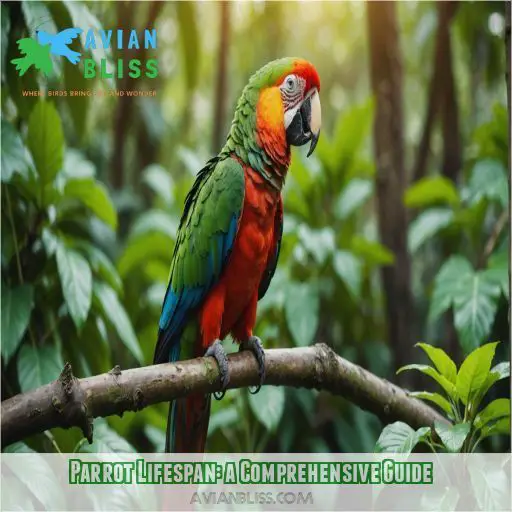
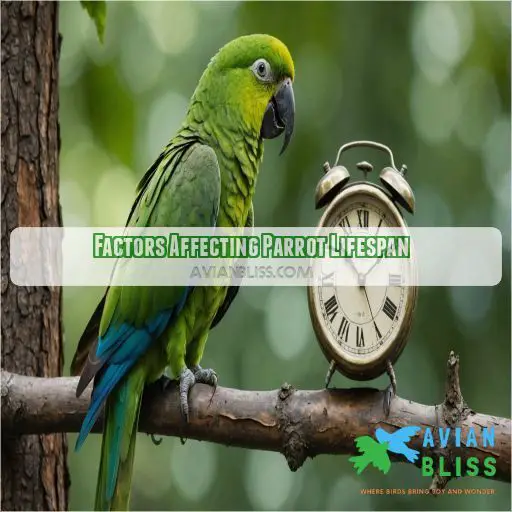
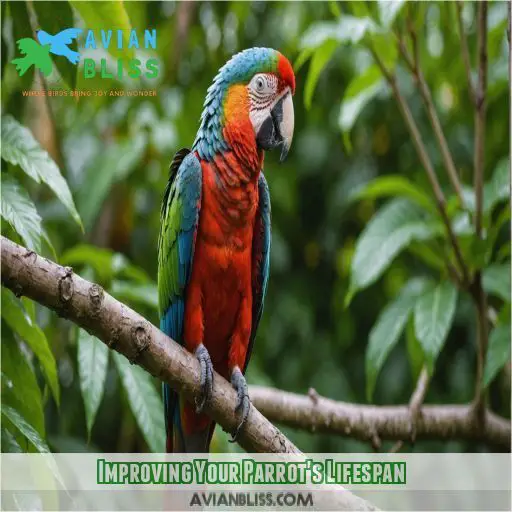
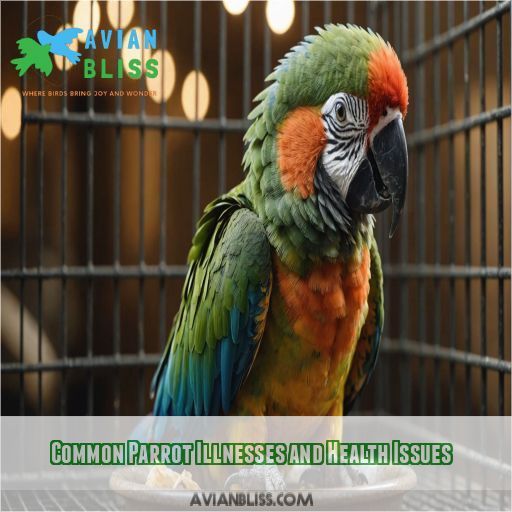
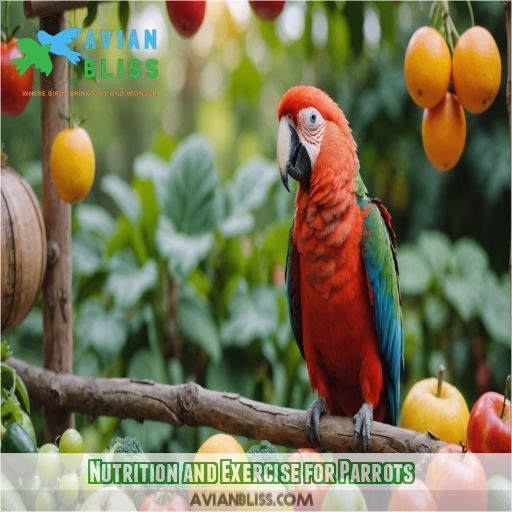
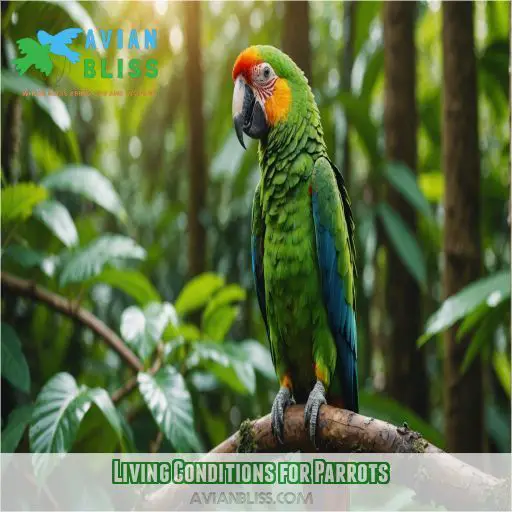
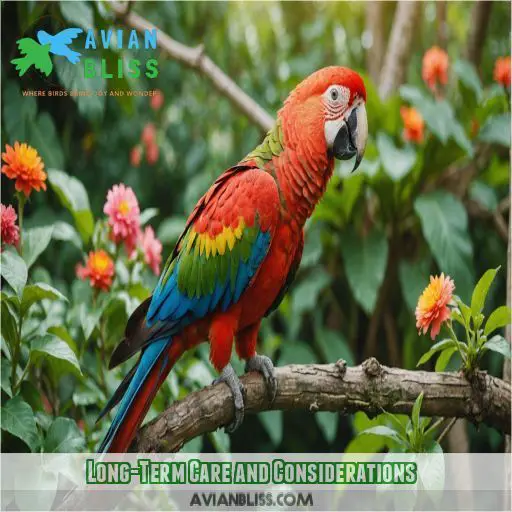
0 Comments